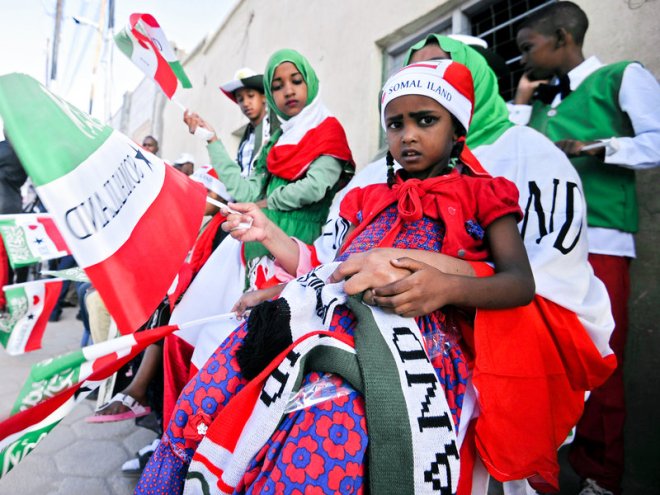
Saturday November 11, 2017
Somaliland's three presidential candidates have concluded their campaigns ahead of Monday's poll to elect the next leader of the breakaway region.
Muse Bihi of the ruling Kulmiye party, Faisal Ali Waraabe of the For Justice and Development party (UCID) and Abdirahman Mohamed Abdillahi of the Wadani party held their final rallies this week in the capital, Hargeisa.
A central issue, as always, is how to win international recognition for Somaliland. Somalia, which was once governed by Italy, wants Somaliland to be part of a single Somali state. But Somaliland, which used to be a British colony and broke away from the rest of Somalia in 1991, wants to be a separate country.
All three candidates favor a fully independent Somaliland but have different visions of how to achieve it.
Waraabe wants the negotiations to come after what he terms as a genuine reconciliation among Somali tribes.
"Somalis have never reconciled among themselves; therefore, we want to hold a bottom-up approach reconciliation meeting here," he said. "Once they agree and come up with a shape of a government similar to that of 1960, when we united, we can talk and debate on the possibility of two parallel brotherly states, which I think is the interest for the future of our people."
Abdillahi of the Wadani party wants new rounds of talks with Somalia, but at a bigger venue and with international mediation.
"Principally, we want to solve our differences with Somalia through peaceful negations, review the previous talks and challenges, and finally come up with new rounds of talks, with our final vision being getting a result that makes us two neighbor states," he said.
Social media ban
Preparations for election day are under way. Public and private schools across Somaliland have been closed for eight days because most of them will serve as polling places. Also, Somaliland's National Electoral Commission said social media networks would be shut down on Monday to avoid the spread of misinformation on the election results.
"To avoid social media users who propagate hate speeches and fake news during the election or about the results, we have decided to ban the use of social media platforms for the betterment of Somaliland security," said electoral commission spokesman Sa'id Ali Muse.
Muse said 705,000 Somalilanders are eligible to cast ballots.
History of elections
A 176,000-square-kilometer, semidesert territory on the coast of the Gulf of Aden with an estimated 4 million people, Somaliland has a long history of peaceful elections and executive turnover, made possible by a blend of traditional and modern state institutions and a relative peace it has been enjoying since 1991.
In contrast, Somalia has been racked by decades of protracted lawlessness, poor governance and deadly terror attacks.
In 2010, Somaliland saw a peaceful transfer of power when then-President Dahir Rayale Kahin conceded defeat to Ahmed Mohamed Mohamoud, nicknamed Silanyo. He opted not to seek re-election in the current contest.
Unlike the previous elections, this election has suffered several delays. It was scheduled at one time for last March, but drought coupled with political disagreement among the parties caused the vote to be rescheduled.